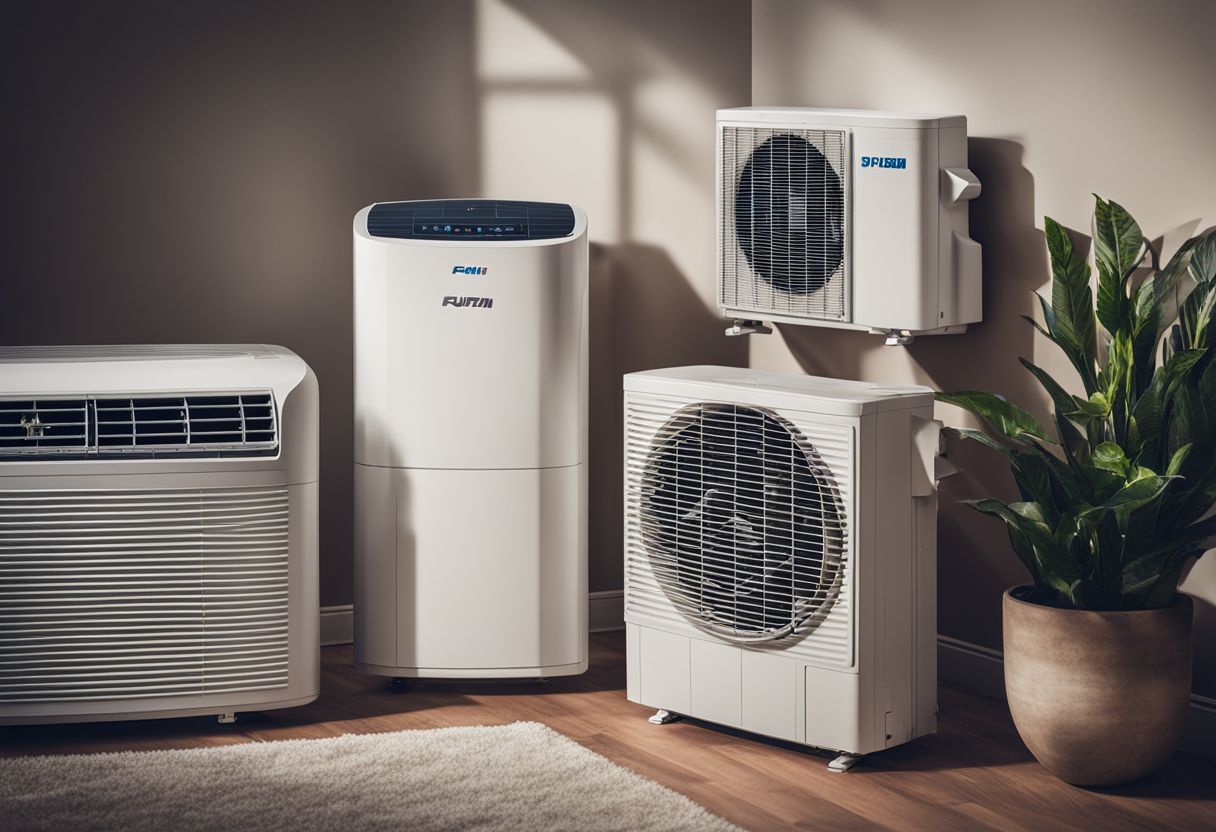Introduction
Choosing the right air conditioning system for your home is crucial for maintaining comfort during the hot summer months. With various options available, it can be challenging to determine which system best suits your needs. This article explores different types of home air conditioning systems, including mini split ductless cooling, swamp coolers, and traditional central air conditioning. By understanding the features, advantages, and disadvantages of each system, you can make an informed decision to ensure efficient and effective cooling for your home.
Air conditioning services play a crucial role in ensuring that your home air conditioning system functions efficiently and effectively. Regular maintenance and timely repairs provided by professional air conditioning services Denver can prolong the lifespan of your unit and enhance its performance.
Overview of Home Air Conditioning Systems
Home air conditioning systems can be broadly categorized into several types, each with its unique method of cooling and distributing air. The primary systems include:
- Central Air Conditioning
- Mini Split Ductless Cooling
- Swamp Coolers
- Window Air Conditioners
- Portable Air Conditioners
Each system has its own advantages and disadvantages, which we will explore in detail.
Central Air Conditioning
How Central Air Conditioning Works
Central air conditioning is one of the most common and effective cooling solutions for homes. It uses a network of ducts to distribute cooled air from a central unit to various rooms. The system consists of an outdoor compressor unit and an indoor evaporator coil. The compressor circulates refrigerant between the outdoor unit and the indoor coil, cooling the air, which is then blown through the ductwork by a fan.
Advantages of Central Air Conditioning
- Uniform Cooling: Provides consistent and even cooling throughout the entire home.
- Quiet Operation: The main components are located outside, minimizing indoor noise.
- Air Quality: Central air conditioning systems often include filters that improve indoor air quality by removing dust, pollen, and other allergens.
Disadvantages of Central Air Conditioning
- High Installation Cost: Installing a central air conditioning system can be expensive, especially if ductwork needs to be added or modified.
- Energy Consumption: Central air conditioning systems can be energy-intensive, leading to higher utility bills.
- Maintenance: Requires regular maintenance to keep the system running efficiently.
Mini Split Ductless Cooling
How Mini Split Ductless Cooling Works
Mini split ductless systems are a flexible and efficient cooling solution that does not require ductwork. These systems consist of an outdoor compressor unit connected to one or more indoor air handling units by a conduit that houses the refrigerant tubing, power cable, and condensate drain. Each indoor unit can be controlled independently, allowing for zone cooling.
Advantages of Mini Split Ductless Cooling
- Energy Efficiency: Mini split systems are highly efficient, as they do not suffer from the energy losses associated with ductwork.
- Zone Cooling: Allows for individual temperature control in different rooms, enhancing comfort and saving energy.
- Easy Installation: Installation is less invasive and quicker compared to central air conditioning systems.
Disadvantages of Mini Split Ductless Cooling
- Initial Cost: Higher upfront cost compared to other cooling systems.
- Aesthetics: Indoor units are mounted on walls, which may not blend with all interior designs.
- Maintenance: Filters and coils need regular cleaning to maintain efficiency.
Swamp Coolers
How Swamp Coolers Work
Swamp coolers, also known as evaporative coolers, use the natural process of evaporation to cool the air. They consist of a fan, water pump, and pads soaked with water. The fan pulls hot, dry air through the wet pads, causing the water to evaporate and cool the air, which is then blown into the home.
Advantages of Swamp Coolers
- Energy Efficiency: Swamp coolers use significantly less electricity compared to traditional air conditioning systems.
- Eco-Friendly: They do not use refrigerants, which can be harmful to the environment.
- Humidity Control: Swamp coolers add moisture to the air, which can be beneficial in dry climates.
Disadvantages of Swamp Coolers
- Climate Dependent: Swamp coolers are most effective in hot, dry climates and may not work well in humid conditions.
- Maintenance: Require regular maintenance, including pad replacement and water level checks.
- Limited Cooling: May not provide the same level of cooling as traditional air conditioning systems.
Window Air Conditioners
How Window Air Conditioners Work
Window air conditioners are self-contained units installed in a window or a hole in an exterior wall. They consist of a compressor, condenser, evaporator, and fan, all housed in a single unit. The unit pulls in warm air from the room, cools it, and then blows it back into the room while expelling the heat outside.
Advantages of Window Air Conditioners
- Affordability: Generally less expensive to purchase and install compared to central or mini split systems.
- Ease of Installation: Can be installed without professional help, making them a convenient option for renters.
- Energy Efficiency: Ideal for cooling individual rooms, reducing the need to cool the entire home.
Disadvantages of Window Air Conditioners
- Aesthetics: Can obstruct views and may not fit with the home’s exterior design.
- Noise: Typically noisier than other types of air conditioning systems.
- Limited Coverage: Suitable for cooling single rooms, but not practical for larger homes or multiple rooms.
Portable Air Conditioners
How Portable Air Conditioners Work
Portable air conditioners are standalone units that can be moved from room to room. They work similarly to window air conditioners but are not permanently installed. The unit pulls in warm air, cools it, and expels the heat through a hose vented out a window or sliding door.
Advantages of Portable Air Conditioners
- Mobility: Can be easily moved to different rooms as needed.
- Easy Installation: No permanent installation required, making them a good option for renters.
- Versatility: Can be used in various locations, such as bedrooms, offices, and living rooms.
Disadvantages of Portable Air Conditioners
- Efficiency: Generally less efficient than other types of air conditioning systems.
- Noise: Can be noisy due to the compressor and fan being housed in the same unit.
- Space: Take up floor space and require a window or door for venting the exhaust hose.
Comparative Analysis of Air Conditioning Systems
Efficiency
- High Efficiency: Mini split ductless cooling and swamp coolers.
- Moderate Efficiency: Central air conditioning and window air conditioners.
- Lower Efficiency: Portable air conditioners.
Installation and Maintenance
- Easiest Installation: Window air conditioners and portable air conditioners.
- Moderate Installation: Mini split ductless cooling and swamp coolers.
- Complex Installation: Central air conditioning.
Cost
- Lower Initial Cost: Window air conditioners and portable air conditioners.
- Moderate Initial Cost: Swamp coolers.
- Higher Initial Cost: Central air conditioning and mini split ductless cooling.
Comfort and Air Quality
- Best Comfort: Central air conditioning and mini split ductless cooling (consistent and uniform cooling).
- Best Air Quality: Central air conditioning (built-in filtration systems).
- Humidity Control: Swamp coolers (add moisture to dry air).
Maintenance Tips for Air Conditioning Systems
Proper maintenance is essential for ensuring the efficiency and longevity of your air conditioning system. Here are some maintenance tips for each type of system:
Central Air Conditioning
- Filter Replacement: Replace or clean filters every one to three months to maintain airflow and efficiency.
- Duct Inspection: Inspect and clean ducts regularly to prevent dust buildup and improve air quality.
- Outdoor Unit Maintenance: Keep the outdoor unit free of debris and ensure there is adequate airflow around it.
Mini Split Ductless Cooling
- Filter Cleaning: Clean filters every month to ensure efficient operation.
- Coil Maintenance: Inspect and clean the coils regularly to prevent dust buildup and maintain efficiency.
- Check for Leaks: Inspect the conduit for any signs of refrigerant leaks and address them promptly.
Swamp Coolers
- Pad Replacement: Replace the cooling pads annually or as needed to ensure efficient operation.
- Water Level Check: Regularly check and maintain the water level in the cooler.
- Cleaning: Clean the unit regularly to prevent mold and mildew growth.
Window Air Conditioners
- Filter Cleaning: Clean or replace filters every month during the cooling season.
- Inspect Seals: Check the seal around the unit to ensure no warm air is leaking into the room.
- Coil Maintenance: Clean the coils to maintain efficient cooling performance.
Portable Air Conditioners
- Filter Cleaning: Clean or replace filters every one to two months.
- Vent Hose Inspection: Ensure the vent hose is properly connected and free of obstructions.
- Drain Water: Regularly drain the water collected by the unit to prevent overflow and maintain efficiency.
Enhancing Air Conditioning Efficiency
Improving the efficiency of your air conditioning system can reduce energy consumption and lower utility bills. Here are some tips to enhance efficiency:
Use a Programmable Thermostat
Programmable thermostats allow you to set specific temperatures for different times of the day, reducing energy use when cooling is not needed. Smart thermostats offer additional features, such as remote control and energy monitoring.
Improve Home Insulation
Proper insulation can significantly reduce heat gain, improving the efficiency of your air conditioning system. Insulate walls, attics, and floors, and seal any gaps or cracks around windows and doors.
Regular Maintenance
Routine maintenance ensures your air conditioning system operates at peak efficiency. Follow the maintenance tips outlined in this article to keep your system running smoothly.
Shade the Outdoor Unit
If you have a central air conditioning system, shading the outdoor unit can help reduce the temperature around it, improving efficiency. However, ensure there is still adequate airflow around the unit.
Use Ceiling Fans
Ceiling fans can help circulate cool air throughout your home, reducing the workload on your air conditioning system. Set the fans to rotate counterclockwise during the summer to create a cooling breeze.
Conclusion
Understanding the different types of home air conditioning systems is essential for making an informed decision about the best cooling solution for your home. From traditional central air conditioning and mini split ductless cooling to swamp coolers, window air conditioners, and portable units, each system has its unique advantages and disadvantages. By considering factors such as efficiency, installation cost, comfort, and maintenance, you can select the most suitable air conditioning system for your needs. Additionally, adopting energy-efficient practices and regular maintenance can enhance the performance and longevity of your system, ensuring a comfortable and cool home during the hot summer months.










